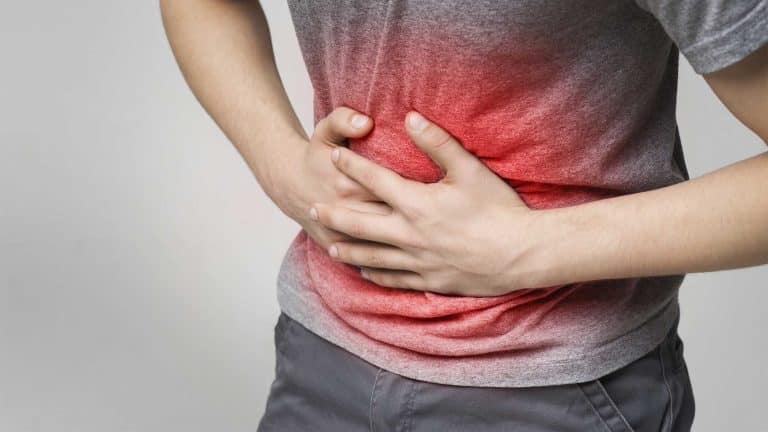Alcohol & Pancreatitis | Heavy Alcohol Use & Your Pancreas
- Alcohol Abuse And Pancreatitis
- Types Of Alcohol-Induced Pancreatitis
- Symptoms Of Alcohol-Induced Pancreatitis
- Risk Factors For Alcohol-Induced Pancreatitis
- Treatment For Alcohol-Induced Pancreatitis

The pancreas is located in the upper abdomen. Its primary purposes are to turn the food we eat into energy and control/regulate blood sugar. It releases hormones like insulin and glucagon to manage blood sugar levels.
While it’s not entirely clear how alcohol causes these processes to malfunction, multiple studies show that heavy alcohol use is linked to pancreatitis.
How Does Alcohol Abuse Lead To Pancreatitis?
Chronic alcohol abuse damages the cells of the pancreas and messes with its metabolic process.
The pancreatic acinar cells metabolize alcohol into toxic byproducts that damage the pancreas. This leads to digestive enzymes that are normally released into the small intestine to build up in the pancreas and, ultimately, digest in the pancreas.
The damage done to pancreatic tissue leads to inflammation, and, if not treated, leads to alcoholic pancreatitis.
Heavy drinking is one of the most common causes of pancreatitis. Both types of pancreatitis increase the risk for pancreatic cancer which can be life-threatening.
Types Of Alcoholic Pancreatitis
There are two types of alcohol-induced pancreatitis: acute and chronic.
Acute Alcoholic Pancreatitis
Acute pancreatitis comes on quickly and is caused by drinking too much alcohol and destroys the cells of the pancreas. Drinking alcohol is the second most common cause of pancreatitis after gallstones. Acute pancreatitis may be brought on by binge drinking over a five-year period.
Acute pancreatitis lasts for a short period of time and likely ends with a complete recovery.
However, recovery time depends on continued alcohol use, age, tobacco use, and if the person has any liver diseases like cirrhosis.
In severe cases of acute pancreatitis, patients may experience tissue damage, infection, and cysts.
Chronic Alcoholic Pancreatitis
Chronic pancreatitis may also occur because of heavy alcohol consumption. Those who have recurrent bouts of acute pancreatitis and who continue to abuse alcohol may develop chronic pancreatitis.
Chronic pancreatitis is defined by long-lasting inflammation of the pancreas that continues for a long period of time.
Symptoms Of Alcohol-Induced Pancreatitis
Acute and chronic pancreatitis have similar symptoms, but range in severity and how long they last. The symptoms of alcohol-induced pancreatitis may include:
- severe abdominal pain
- swollen and tender abdomen
- back pain
- jaundice (yellowing of the skin and eyes)
- fever
- nausea or vomiting
- loss of appetite
- increased heart rate
- weight loss
- diarrhea
- low blood pressure
Risk Factors For Alcoholic Pancreatitis
Whether you get alcoholic pancreatitis depends on a number of factors, including:
- heavy alcohol use and binge drinking
- obesity
- family history of pancreatitis
- family history of alcohol use disorder
Treatment For Alcoholic Pancreatitis
The damage done by pancreatitis can be reversed but only if it’s not chronic. It’s very difficult to treat and reverse the damage done by chronic pancreatitis.
However, there are treatment options available that can help alleviate symptoms and stop the problem from getting worse.
Stop Drinking
Quitting drinking is the first thing you can do to help treat pancreatitis. Alcohol use disorder is likely treated with medical detox support for withdrawal, inpatient or outpatient care, and support groups like Alcoholics Anonymous.
Change Diet
Your healthcare provider may also require you to change your diet. A low-fat diet that starts with clear liquids and then slowly moves to solid meals the more you heal may be recommended.
They may also advise you to eat small, more frequent meals to decrease the number of pancreatic enzymes.
Medication
Medications, including pain medications, are often prescribed by healthcare providers to help with the symptoms of pancreatitis.
For severe pancreatitis, antibiotics may be prescribed to deal with the infection, but for most cases, pain medication like acetaminophen (Tylenol), meperidine, and tramadol are used.
Surgery
In the most severe cases of pancreatitis, surgery may be needed to remove the damaged pancreatic tissue. This type of surgery likely includes the surgeon making a new pancreatic duct or passageway to allow digestive fluid to drain and to reduce the amount of inflammation.
Removing the gallbladder can also help reduce the amount of inflammation.
If you or a loved one struggles with alcohol abuse, contact us to learn about our treatment programs.
Written by Ark Behavioral Health Editorial Team
©2024 Ark National Holdings, LLC. | All Rights Reserved.
This page does not provide medical advice.
National Library of Medicine: MedlinePlus - Chronic Pancreatitis
National Library of Medicine: MedlinePlus - Pancreatitis
StatPearls - Acute Pancreatitis
StatPearls - Alcoholic Pancreatitis

Questions About Treatment?
Ark Behavioral Health offers 100% confidential substance abuse assessment and treatment placement tailored to your individual needs. Achieve long-term recovery.
100% confidential. We respect your privacy.
Prefer Texting?
Our friendly support team is here to chat 24/7. Opt out any time.







 Learn More
Learn More








